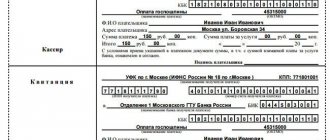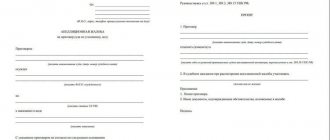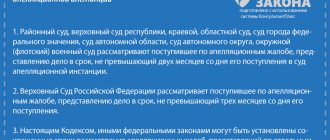Who can initiate a cassation appeal and on what grounds?
Important. Cassation is an important stage in appealing court decisions.
According to paragraph 1 of Art. 401.2 of the Code of Criminal Procedure of the Russian Federation the following have the right to appeal a procedural act:
- the convicted person himself, his representative;
- justified, his defender;
- a citizen, if the case against him was terminated due to the expiration of the statute of limitations for committing a crime, as well as his defense lawyer;
- victim, representative of a minor victim, legal representative;
- a citizen against whom educational or medical measures have been taken;
- private prosecutors;
- civil plaintiffs and defendants.
In addition to the indicated persons, the following may apply to initiate cassation proceedings in the case:
- Prosecutor General of the Russian Federation or his deputy;
- military prosecutor;
- Prosecutor of a constituent entity of the Russian Federation.
The exhaustive grounds for filing a cassation appeal are indicated in Art. 389.17, 401.1, 401.15 of the Code of Criminal Procedure of the Russian Federation, additional explanations are given in paragraph 10 of Resolution No. 2 “On the application of the norms of Chapter 47.1 of the Criminal Procedure Code of the Russian Federation governing proceedings in the court of cassation.”
Important. The main task of cassation is to check the legality of the sentence passed and to identify violations of the norms of the Code of Criminal Procedure committed by lower courts.
A study and assessment of evidence is carried out, recognizing them as admissible or unacceptable, as well as identifying errors in establishing the circumstances of the case that significantly influenced the decision.
Complaints about the discrepancy between the imposed punishment and the gravity of the crime are also subject to verification.
In accordance with Art. 401.15 of the Code of Criminal Procedure of the Russian Federation, the sentence may be changed or canceled if the following facts are established in cassation:
- deprivation of rights of participants in the process or restrictions thereon;
- violation of the established procedure in court;
- other violations resulting in distortion of the circumstances of the case.
According to Art. 389.17 of the Code of Criminal Procedure of the Russian Federation, you can file a complaint with the cassation in cases where:
- the appeal made a decision in the absence of the convicted person or his defense lawyer;
- there is no protocol of the meeting or it was drawn up with significant violations (for example, the name of the assistant judge is not indicated, there are no signatures of the persons who compiled the document);
- the defendant was forced to testify in a language he does not speak well;
- one of the parties was deprived of the right to participate in the debate;
- the defendant was deprived of the right to say the last word;
- the verdict is based on inadmissible evidence;
- The judge did not go into the deliberation room when making his decision.
Attention! The cassation court has the right to go beyond the complaint and check all the circumstances of the criminal case if this leads to a significant improvement in the situation of the convicted person.
Reasons for refusal to consider
Article 387 of the Civil Procedure Code of the Russian Federation states the grounds that give the right to cancel or change a court decision in cassation. These include violations of legal norms of a substantive or procedural nature.
It is important that they influence the outcome of the case. At the same time, the citizen must show that if the violations are not eliminated, then the rights will not be restored.
Within the framework of part two of Article 390 of the Code of Civil Procedure of the Russian Federation, the correct interpretation of regulatory legal acts is checked. It is important that the courts do this within the limits of the arguments of the cassation appeal.
Article 390 of the Code of Civil Procedure of the Russian Federation. Powers of the cassation court
The cassation court has the right to go beyond the arguments of the document. At the same time, the legality of decisions that are not appealed does not need to be checked. If the circumstances have not been established or rejected, then they cannot be appealed.
If the cassation instance establishes that the norms of procedural law are accepted by the bodies of the first and appellate instances, the court will take into account these circumstances. It is important to prove that the evidence led to a miscarriage of justice of a significant and compelling nature.
Based on paragraph three of part two of Article 377 of the Code of Civil Procedure of the Russian Federation, if the decisions were appealed by the presidium of a regional or regional court, then cassation appeals can be sent to another instance. This is the Judicial Collegium for Civil Cases of the Supreme Court of the Russian Federation.
Deadlines for appeal
Previously, it was possible to file a complaint within a year from the date of the verdict. In 2014, the time limit was abolished by Federal Law No. 518-FZ dated December 31, 2014, “On amendments to Articles 401.2 and 412.2 of the Criminal Procedure Code of the Russian Federation and the recognition as invalid of certain provisions of legislative acts of the Russian Federation.”
Thus, the Code of Criminal Procedure does not limit the time limits for filing complaints in criminal cases. Since 2015, the convicted person and his defense attorneys can request a review after several years.
From the point of view of the European Court of Human Rights, the duration of the threat of criminal prosecution should be limited. It is unacceptable when the sentence against a convicted person, who has already served most of the sentence, is classified under another, more serious article, and the punishment is significantly increased.
It is also contrary to the norms of international law to prosecute a previously acquitted citizen several years after the decision was made.
Art. 401.6 of the Code of Criminal Procedure contains an indication that the prosecution, victims and their legal representatives may file a cassation appeal within 1 year if it contains the following requirements:
- reclassify the crime under a more serious article;
- increase sentences;
- change suspended sentences for serving sentences in a colony;
- refuse to commute a sentence due to pregnancy, disability, or the presence of minor children or dependents;
- cancel the decision to terminate criminal prosecution;
- overturn the acquittal and convict.
Important! After 1 year, submitted complaints will be left without consideration, requests to restore the missed deadline will be left unsatisfied.
More information about the deadlines for filing and consideration of a cassation appeal can be found here.
Common mistakes
It is important to draft a complaint correctly. This will avoid temporary and other problems.
You need to study the main common mistakes that people make when preparing a document:
| Often the document does not contain clear arguments | The applicant needs to substantiate his claims, which make it possible to recognize the court decision or its components as illegal. Arguments must be based on the contested court decision. |
| Copies of documents must be attached to the complaint | There should be enough sets so that there is enough for all participants in the case. You also need to provide evidence confirming the fact of violations committed by the judicial authorities of the previous level. If these documents are missing, the complaint will not be accepted for consideration. The same decision is made if there are not enough copies. |
| The complaint must be signed by the complainant | If a citizen applies through a legal representative, he must sign the document. |
| If the state fee is not paid, the complaint will not be accepted. | The basis and amount of payment are determined individually. Details may vary depending on the place where the application is submitted. |
If errors are found, the cassation appeal will be left without consideration by the judge. The applicant is given a certain period during which the deficiencies can be corrected. If the citizen manages to do this, the court sets the date of initial filing as the date of acceptance. Thus, the application period does not actually change.
Also, the court will not consider the complaint if the document contains insults or incorrect phrases regarding the court, as well as the persons participating in the process.
Applications will be rejected and sent back to the recipient. In addition, the court has the right to visit law enforcement agencies to bring the author of the document to justice.
Right to go to court
The right to go to court if you disagree with the decision of the appellate instance is provided for in Art. 401.2 Code of Criminal Procedure. All persons participating in the case can file a complaint : the victim, the convicted person, the acquitted person, their legal representatives, the prosecution represented by the prosecutor or his deputy.
In addition to these parties, other persons whose interests are affected by the decision have this right. As such, the list of “other persons” who have the right to challenge a court decision in cassation is not limited to the current Code of Criminal Procedure of the Russian Federation or other regulations.
For example, if during the proceedings the judge made a decision to suspend the case, to return it to the court of first instance or to the prosecutor's office, or to terminate the criminal prosecution, all those affected by this decision received the right to challenge it in a higher authority.
The following may act as other persons:
- citizens who were refused to initiate criminal proceedings;
- pledgors whose property was seized as part of a criminal case;
- Commissioner for Human Rights;
- as well as those who were not recognized as participants in the process, but need judicial protection.
Attention! The plaintiff in a civil claim filed during the consideration of a criminal case also has the right to appeal the decision to the cassation court in criminal cases, but within the framework of the stated requirements.
State duty issues
If the complaint belongs to the general category, the filer must pay a fee of 150 rubles. The following persons are exempt from paying state duty:
- The plaintiff, if the essence of the dispute is a disagreement in labor relations.
- Plaintiff, if the essence of the dispute is related to alimony.
- The plaintiff, if the essence of the dispute is the recovery of funds for moral or physical damage.
- Both parties if a divorce decree is required.
- An individual, if the essence of the dispute is the methods of collecting funds.
- Plaintiffs, if the essence of the dispute involves compensation for moral or physical damage due to criminal prosecution.
- Rehabilitated citizens.
- Refugees, in cases of claim for recognition of status.
- Representatives of federal authorities on consumer rights in the event that the above-mentioned consumer rights are protected.
- An individual, if we are talking about adoption.
- Plaintiffs, when it comes to protecting children's rights.
- Plaintiff, if we are talking about protecting the rights of people with disabilities.
- The plaintiff, if the essence of the dispute is the forced confinement of an individual to a psychiatric hospital.
- Representatives of government agencies.
- Individuals who are in custody, if we are talking about requesting copies of documentation related to a court decision.
You can download the cassation complaint template from this link
This is important to know: Notice of unilateral termination of the contract
Design and content
The requirements for filing a complaint are set out in Art. 401.4 of the Code of Criminal Procedure of the Russian Federation, it must be in writing, indicating the following information:
- in the header you must write the name of the court to which the document is sent;
- Full name, procedural position, place of residence of the person filing the complaint;
- information about the progress of the case, i.e. a brief summary of what authorities considered it, when and what decisions were made;
- the decision that the applicant wants to appeal in cassation;
- a list of violations of the Criminal Code and the Code of Criminal Procedure committed by the courts, which influenced the consideration of the case and resulted in the issuance of an unauthorized decision;
- the essence of the request or submission (for example, reversal of the sentence and referral of the case for a new trial in a different court).
If a person has not previously taken part in the process, in the complaint he must indicate which rights were violated by the decision that has entered into force.
The document must be left without consideration if it is not signed by an authorized person, for example, a cassator.
Important. If the complaint is signed by a legal representative, it is necessary to attach a copy of the power of attorney or attorney's order, as well as copies of all previously made decisions, duly certified.
We do not recommend completing the documents yourself. Save time - contact our lawyers by phone:
8 (800) 350-14-90
Allowed Exceptions
Under specific circumstances, the time period established for filing may be revised. Such assumptions are only possible with compelling reasons. If the authority's staff makes mistakes when working with such documentation, this is sufficient grounds for revision. Also, review is allowed if the applicant’s relatives suffer from severe illnesses.
A common situation: the judge did not notify the representative of one of the parties about the date of the trial. This situation is not uncommon, because civil cases are sometimes considered without the presence of the defendant. As a result of the proceedings, the resolution came into force, and the period allowed for cassation expired. In such a situation, it is possible to file a petition to review the period for a cassation appeal.
A similar petition may be submitted if the defendant was absent due to the following circumstances:
- The disease is severe. Implies lack of physical ability. For example, the defendant was in a mental hospital, as a result of which he was unable to perceive information about the deadlines for cassation.
- The defendant suffered sudden injuries and was unable to move as a result. This category also includes those circumstances when the defendant is prescribed specific drugs due to an incurable disease.
- If the defendant was away due to caring for family members.
- If the defendant was directly or indirectly involved in the disaster. Likewise, if the defendant was directly or indirectly affected by natural disasters.
This is important to know: Agreement to terminate the contract by agreement of the parties
It is recommended to use a cassation claim template when drawing up; this will help avoid common mistakes and increase the chances of successful consideration of the document in the authority. If possible, it is advisable to seek the assistance of a professional lawyer, this will help avoid a number of delays that those without relevant experience in legal matters face.
It is important to know that claims of this nature require documentary evidence of each related aspect. Even if we are talking about situations that affected the common cause only indirectly, verification in all aspects should be attached to the complaint.
Submission order
Like any other cassation appeal, you can only file it once. In order for it not to be rejected, it is necessary to comply with a number of important rules provided for in Art. 401.3 Code of Criminal Procedure of the Russian Federation.
Where is it served?
In accordance with paragraphs 1-4 of Part 1 of Art. 401.3 Code of Criminal Procedure of the Russian Federation:
- Resolution, verdict of the magistrate court; The verdict, ruling, decision of a district court, the supreme court of a republic, a regional or regional court, a court of a federal city, a court of an autonomous region, a court of an autonomous district, as well as a court of appeal of general jurisdiction are appealed to the Judicial Collegium for Criminal Cases of the corresponding cassation court of general jurisdiction.
- All decisions specified in paragraph 1, previously considered in cassation courts of general jurisdiction, are further appealed to the Judicial Collegium for Criminal Cases of the Supreme Court of the Russian Federation.
- Sentences and rulings of garrison military courts and appellate courts are appealed to the military court of cassation, then to the Judicial Collegium for Military Personnel of the Supreme Court of the Russian Federation.
Unlike an appeal, a cassation appeal is filed directly with the office of the court that will hear the case (read about the intricacies of filing a cassation appeal against an appeal ruling here).
Government duty
Important. According to current legislation, state fees are not charged to citizens or organizations appealing court decisions in criminal cases.
This rule applies to the appellate and cassation instances.
According to subparagraph 8 of Part 1 of Art. 333.36 of the Tax Code of the Russian Federation also exempts individuals who are recognized as victims in criminal cases and who dispute the amount of compensation for lost property or moral damage caused by a crime from paying the fee.
Terms of consideration
The Code of Criminal Procedure limits the time allotted for the consideration of received complaints by the cassation. Yes, Art. 401.13 of the Code of Criminal Procedure states that courts of general jurisdiction are required to resolve the case within two months from the date of the decision to initiate proceedings in the case. For the Supreme Court, the period has been increased to three months.
More details about the terms of consideration, as well as filing a cassation, are discussed in this article.
Judge's decision to send the paper to the collegium or refusal
After receiving the complaint, the judge examines the arguments referred to by the cassator and gets acquainted with the documents attached to it. If the violations committed during the consideration of the case are significant, the judge has the right to request the case materials for detailed study and making a decision. After the arguments of the complaint are verified, the judge makes a decision:
- about refusal of satisfaction for lack of grounds for review of the sentence;
- on transferring the case to proceedings and scheduling hearings.
Important! The decision is made within one month from the receipt of the complaint or two months if the case materials were requested for study from the court of first instance. If the case materials are received along with the complaint, the decision is made within 20 days.
The resolution must comply with the requirements of Art. 401.11 Code of Criminal Procedure and contain information about:
- date of document preparation;
- Full name and position of the judge who made the decision;
- the reasons for which the decision was made to refuse or to initiate proceedings;
- appealed judicial acts;
- the person whose complaint or presentation was considered;
- the method of participation in the meeting of a person in prison.
We do not recommend completing the documents yourself. Save time - contact our lawyers by phone:
8 (800) 350-14-90
We invite you to familiarize yourself with the materials of our experts on the grounds, rules and procedure for filing cassation complaints in a civil case and in an arbitration court.
Notification of Participating Parties
After a ruling has been issued to initiate cassation proceedings in the case, a written notification is sent to all interested parties with a copy of the ruling, a cassation appeal, as well as a notice of the place, date and time of consideration of the case.
The courts are obliged to fulfill the requirement of Part 2 of Art. 401.12, namely, to inform all parties to the process at least 14 days before the date of the hearing. If the parties did not appear to participate in the trial or did not submit motions for adjournment for a valid reason, the court may consider the case without their participation.
Revision process
Important! Consideration of a case in the absence of a representative of the prosecutor's office is unacceptable and is a significant violation.
Before considering the complaint, the presiding judge is obliged to find out who is present in court, whether the parties have any challenges or motions on the merits of the case. The decision to satisfy petitions is made by judges collegially , through a meeting in the courtroom.
After the court fulfilled the requirements of Part 2 of Art. 389.13 of the Code of Criminal Procedure of the Russian Federation, the judge, acting as a rapporteur, reads out the complaint and the ruling, sets out the circumstances of the case and the essence of previously made decisions. After the documents are read out, other judges can ask questions to the speaker and make comments.
All those present can speak during the court hearing, the first word is given to the one who filed the complaint, then to everyone else in the manner prescribed by law. After hearing the parties, the judges can ask clarifying questions, study the protocols, consider motions, and read out the case materials. The judges then retire to the deliberation room to make a decision.
Features of the document
Court decisions of any type can be appealed. The exception is decisions made by the Supreme Court of the Russian Federation. The procedure for applying is reflected in Chapter 41 of the Civil Procedure Code of the Russian Federation.
Any citizens who participate in the process can apply. This is provided if their rights and interests were violated as a result of the decision made.
A citizen is obliged to apply within the period established by law. In this case, other means of appeal must be exhausted. The procedure for filing an application is prescribed in Part 4 of Article 112 of the Civil Procedure Code of the Russian Federation.
In some cases, the period may be restored. This is provided if the judicial authority recognizes his omission as lawful and the reason is valid.
Article 112 of the Code of Civil Procedure of the Russian Federation. Restoration of procedural deadlines
A cassation appeal makes it possible to confirm or refute the objectivity of the interpretation and application of legal acts by courts of various instances.
The content of the complaint must reflect the number of the court ruling that is being refuted. Other main points of the document are also highlighted.
Submission deadlines
The deadline for filing a complaint is prescribed by law. It is six months. The countdown begins from the moment when a citizen receives a court decision that is subject to appeal.
Often there are no problematic issues with calculating the terms of application. In this case, the person will have two decisions of the judicial authority in his hands.
The first is a ruling made by the court earlier. The second document can be considered a determination regarding the appeal.
Both solutions take effect simultaneously. The start date is the moment the appeal is issued. Thus, the countdown begins from the next day after receipt of the appeal, which comes into force.
What is the order
Article 377 of the Civil Procedure Code of the Russian Federation states that an appeal must be filed with the appropriate judicial authorities. It is necessary to choose the authorities that consider appeals, and not those that made the contested decision (as happens during an appeal).
Appeal documents can be appealed to the presidiums of the courts of the territory, region, district, republic. If the decision was made by a magistrate’s court or a district authority, then you need to contact their presidiums.
Article 377 of the Code of Civil Procedure of the Russian Federation. The procedure for filing a cassation appeal, presentation
If an appeal has already been made to these bodies, then you need to visit the collegium of the Supreme Court of the Russian Federation.
Depending on the type of case being considered, you need to submit an appeal to the board for:
- administrative;
- civil;
- economic;
- military affairs.
In order for a cassation appeal not only to be registered, but also accepted by the relevant body for consideration, you must follow certain rules:
- The requirements for a complaint are prescribed in Article 378 of the Civil Procedure Code of the Russian Federation. It notes that the document must contain basic information about the originator and the government agency.
- The complaint must be accompanied by existing decisions made by the courts of first and second instance. They must be certified accordingly. The certification seal can be affixed to the same judicial authorities.
- You can submit a cassation in the same number of copies as there are participants in the process.
- You must have a receipt for payment of the state fee available at the time of application. You will also need documents confirming your right to receive benefits when paying a special fee, if there are grounds for this.
- Article 376 of the Civil Procedure Code notes the right to file an appeal only if other measures preceding this step have already been exhausted.
Article 376 of the Code of Civil Procedure of the Russian Federation. The right to appeal to the cassation court
Article 378 of the Code of Civil Procedure of the Russian Federation. Contents of cassation appeals, presentations
Sample of a cassation appeal in a civil case
Where is it served?
Persons involved in the judicial proceedings have the right to file a cassation appeal. It is also available to citizens whose rights and interests were violated during the consideration of the case and when a controversial court decision was made.
A person needs to appeal to a cassation court. The application is submitted against the body that made the unsatisfactory decision. Within three working days, the complaint and all case materials are submitted to the cassation for consideration.
To avoid wasting time, you need to be careful when drafting the document. Content must comply with legal standards.
Cassation in criminal proceedings
First, let’s establish the very definition of cassation.
In criminal proceedings, a cassation appeal is a review of the legality of decisions and rulings of lower courts (first or second), if this decision is unfair or violates the legitimate interests/rights of an individual. Proceedings on such a petition and the rules for filing it are regulated by the Code of Criminal Procedure of the Russian Federation, namely:
- Chapter 47.1 of the Code of Criminal Procedure of the Russian Federation;
- Resolution of the Plenum of the Armed Forces of the Russian Federation No. 2 dated January 28, 2014. of the year.
Cassation and appeal - what are the differences?
Until January 2013, uniform deadlines were established for appeal and cassation, namely: no more than 10 days were allotted for appealing the verdict after the court decision was made . An appeal is filed against a verdict that has not entered into force. The main differences between these appeals, cassation and appeal are:
- When considering an appeal, the court may take into account newly discovered circumstances of the case and evidence. That is, when appealing a decision, the trial will proceed regardless of previous considerations. Therefore, the decision of the court of appeal can either soften or tighten the sentence that is being appealed. At the appeal stage, there are very strict deadlines for filing petitions - petitions submitted no later than 10 days from the date of announcement of the court decision are accepted for consideration (Part 1 389.4 of the Code of Criminal Procedure of the Russian Federation). The court will not consider a complaint filed outside the deadline (Part 3 389.4 of the Code of Criminal Procedure);
- During the cassation process, exclusively the same materials of the case are considered, which were relied upon by the court whose decision is being appealed.
Material on the topic How to find a criminal case by the names of the participants in the process?
Cassation and supervisory appeal - their differences
A supervisory appeal is an appeal against a sentence that has already entered into force , passed by a court of a lower level.
Not so long ago, such a complaint did not have a filing deadline - this was its main difference from an appeal and cassation, i.e. it could be filed absolutely at any time: after 5 years, and after 10, and even when the convict has already served his sentence.
Now it is allowed to submit it only within one year , after the court verdict comes into force, regardless of the location of the convicted person. Judicial proceedings by way of supervision may also take into account newly discovered circumstances of the case. One month is allotted for consideration of such a petition after its receipt by the court.
When is a cassation petition filed?
Since the beginning of 2013, after changes came into force in the legislation regarding the procedure for appealing against sentences, a cassation petition is now filed against a court decision that has entered into force. Until January 2013, such a petition was filed only against a court ruling that had not entered into force. The opportunity to file a complaint took place only within 10 days.
In order for a cassation appeal to give a positive result and lead to a review of the case, convincing reasons . There are not many options when it is allowed to file a complaint to a higher court:
- If there are obvious inconsistencies between the judicial conclusion specified in the verdict and the evidence base. In other words, when the guilt of the defendant has not been proven, or the testimony of witnesses has obvious contradictions;
- There were violations in compliance with the norms of criminal procedure law - the rights of the defendant or other participants in the process were violated;
- Incorrect interpretation of the law - in court another article of the law, or its paragraph, was applied, and therefore a more severe punishment was imposed than required according to the Code of Criminal Procedure;
- Undeserved sentence - in this option, the punishment for the criminal act committed was too harsh/mild, disproportionate to the gravity of the crime committed.
Who can apply
- A convicted (or acquitted) citizen, his legal representatives, lawyers;
- The victim, in the event of the death of the victim as a result of a crime - his relatives;
- State prosecutor (prosecutor), private prosecutors;
- In the case of a civil claim - the defendant, plaintiff, or their legal representatives;
- Other persons, if the process affected their personal legitimate interests and rights.
Material on the topic Checking debt by last name in the FSSP: types of debts and methods of verification








